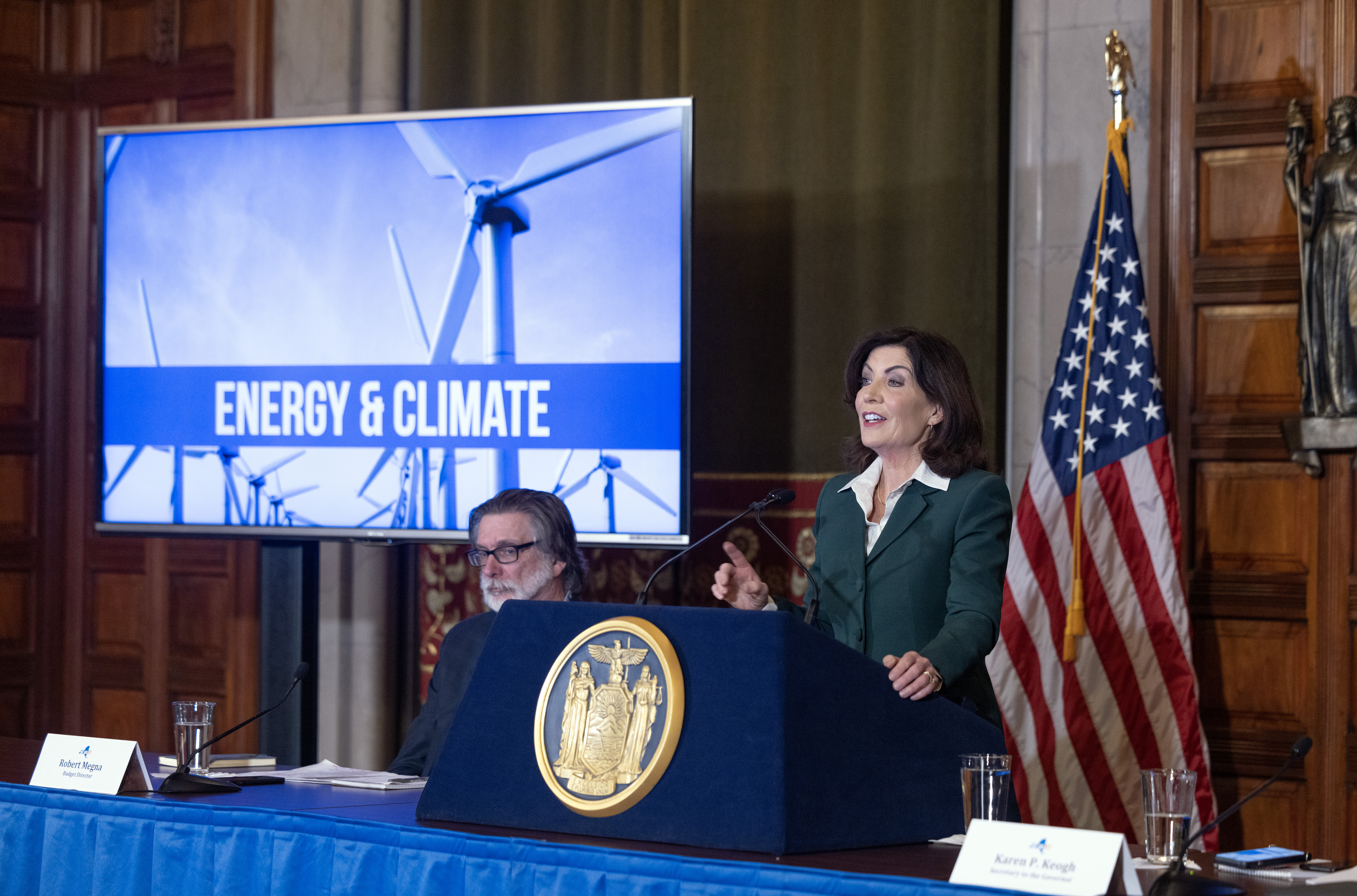[ad_1]

“We’re going to be the first state in the nation to advance zero-emissions new homes and buildings,” Hochul said Thursday, announcing a conceptual deal on the budget that was due March 31.
The measure will help the state achieve its ambitious mandate to slash emissions by 40 percent from 1990 levels by 2030 and 85 percent by 2050 and was recommended in a plan approved in December by state agency heads and outside experts. Exemptions will be included for commercial kitchens, emergency generators and hospitals.
But some key details have not yet been finalized. Hochul also indicated she expects the deal to include rebates to consumers as part of a cap-and-trade initiative for emissions, but a detailed agreement hasn’t been reached on that issue.
There is no measure that eventually bans the replacement of gas furnaces in existing homes included in the budget, which Hochul had proposed and is recommended in the state’s climate plan. Lawmakers rejected that early on in negotiations. And none of the budget proposals included any measure targeting gas stoves in existing buildings.
Details of the agreement will be laid out in state budget bills that have not yet been printed. A potentially major caveat on grid reliability pushed by Assembly Democrats and a major gas utility also hasn’t been finalized, leading environmental advocates to moderate their enthusiasm until they see the final wording.
The Assembly initially proposed a requirement for the state’s Public Service Commission to review the ability of the electric system to support new buildings, although it was not clear how that would function because the requirements for reliable service already enshrined in state law.
“As the governor and legislative leadership continue to hammer out the details, they need to ensure that this is as strong as possible and there aren’t any loopholes,” said Liz Moran, New York policy advocate for Earthjustice. “The technology is ready, and we absolutely have to be doing this to meet our climate law mandates.”
Advocates had pushed for an earlier implementation of the restrictions and pushed back on a later start for commercial buildings. Hochul had initially proposed a split at four stories for the timeline, but environmental groups and Senate Democrats backed seven stories to align with New York City’s zero-emission building law that passed in 2021.
The later date — starting Dec. 31, 2028 — is also expected to apply for commercial buildings and those over 100,000 square feet, Hochul spokesperson Katy Zielinski said.
A measure to end the “100 foot rule” subsidies for new gas hookups, as proposed by Senate Democrats, is not in the budget, Zielinski said. That means utilities will still pass on some costs of hooking up new customers, who they are legally required to serve, to other gas ratepayers.
The state budget will include a provision to allow for rebates to New York residents under a cap-and-trade program that is expected to be rolled out in 2025 and will raise gas prices at the pump and home heating fuel costs. Some additional details about how the funds could be spent may also be included but details are not finalized, according to the governor’s office.
“What we’re doing is setting up a mechanism to be able to allow for rebates that we generate with a cap and invest program,” Hochul said. “We think that is the important first step, because we couldn’t do it under existing law.”
Some environmental advocates had pressed for the Legislature to play more of a role in the parameters of that program, which is expected to be rolled out through regulations by the state Department of Environmental Conservation. It will help the state achieve the emissions reductions required under the 2019 climate law, but Hochul has raised concerns about the costs of the program and sought to rewrite the law to reduce the emissions captured by the measure.
“We’re focusing on aggressive climate protections but we have to make sure that they’re affordable for New Yorkers or it won’t work,” she said.
Hochul also said that a measure to allow the New York Power Authority to build new renewables was included in the deal. The measure will include labor standards, allow but not require NYPA to work with the private sector on renewable projects and includes the “renewable energy access and community help” program for NYPA to provide bill credits to low-income residents to reduce their utility costs, according to the governor’s office.
Assemblymember Ken Zebrowski (D-Rockland County) said the details of the NYPA measure are among the open issues: “Hopefully there is a full agreement soon and everything can go to print, but those details aren’t all worked out yet.”
Hochul also announced the Environmental Protection Fund would be kept at $400 million; $500 million in additional funding would go to water infrastructure.
Lawmakers have also agreed to Hochul’s proposal of $200 million for utility bill relief and $200 million for a NYSERDA program to weatherize and electrify the homes of some low-income New Yorkers.
[ad_2]
#York #set #ban #gas #furnaces #stoves #buildings
( With inputs from : www.politico.com )